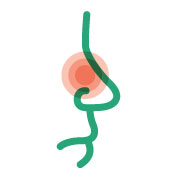
Cosy “sweater weather” may bring a fresh breeze and crisp air—but it is also the season of dry sinuses, chapped lips and other unpleasant symptoms! The fact is, cold air doesn’t hold as much moisture as warm air, which is one reason your lips, nasal passages and skin tend to become sore and dry out when the temperatures start to drop. Adding water vapor to the air in your home, however, can help ease this seasonal annoyance. Symptoms of other health issues that tend to flare up when the air gets colder or dry, such as dry eye or eczema, can also be improved when there is more moisture in the air. Also, during the colder winter months when we have our heating on this can also dry out the air causing issues! As such, using a humidifier could help! Browse our amazing range of Humidifiers here!
As its name implies, a humidifier is a machine that simply adds moisture to the air in your home. By moistening the dry air that can irritate your airways, humidifiers provide amazing benefits and can help ease the following health issues:
 Nasal Congestion
Nasal Congestion
Low humidity could increase survival of the flu virus not only outdoors but also indoors. And while a humidifier won’t help treat the symptoms of a cold or flu, a more humid environment could make it easier to cough up or blow out the bothersome mucus that clings to your chest and airways. Even during winter, indoor allergens, including dust, mould and pet dander, can cause allergy flare-ups.
 Nosebleeds
Nosebleeds
The nose is lined with blood vessels that help warm the air you breathe in. However, dry air or constant nose-blowing can cause the nasal passages to become sore, cracked and to sometimes even bleed. Using a humidifier can help protect the nasal passages and prevent nosebleeds.
 Dry, Itchy Skin
Dry, Itchy Skin
When the air is colder and dry, your skin can also become dry and itchy. In more severe cases, skin can become cracked and start bleeding. One skin condition in particular, called eczema, can worsen when very dry air and indoor heaters take moisture from the skin. A humidifier could help you find some relief.
 Helps Prevent Snoring
Helps Prevent Snoring
For those who breathe through their mouth, it is almost impossible to prevent dryness from happening. This is especially true when sleeping. By using a humidifier to add moisture to the air, you create a more favourable environment that may soothe the tissues at the back of the throat. Not only will this promote more comfortable sleep, but it can also help reduce snoring. Additionally, running the humidifier throughout the day is also beneficial, as it will help the throat stay moist and prevent the irritation that is commonly associated with snoring. The ideal solution for snorer and snore-ee!
 Allergy And Asthma Relief
Allergy And Asthma Relief
If you have asthma, your home’s humidity level can affect your health. Too little humidity and your nose and throat can become dry and irritated, making colds worse and asthma harder to control. In general, indoor humidity levels that range from 30 to 50 percent may be best for those with asthma. This humidity level is also usually comfortable for most people. Keeping the air at the right humidity level may help reduce asthma symptoms.
Types of humidifiers
While most humidifiers have the same function, to add moisture to the air, there are many types are available:
Steam Vaporisers: These use electricity to create steam, which cools before it leaves the humidifier. However, for safety reasons you should avoid using steam vaporisers around children.
Ultrasonic Humidifiers: Instead of electricity, these units use vibrations to vaporise water.
Evaporators: These produce humidity by blowing air past evaporating water.
Risks
Dirty humidifiers
Humidifiers turn water into fresh breathable vapour. If the unit’s water tank is dirty, the vapor you breathe will also be dirty. A dark, dirty tank is an environment that fosters germs, but regular cleaning can help to prevent any issues. Always clean a humidifier thoroughly as directed by the manufacturer. Water should not sit in the humidifier for too long. If the humidifier has a filter, be sure to replace it often.
Too much humidity
Excessive humidity levels can make breathing difficult and some allergy symptoms worse. For example, common allergens including dust mites, mould, and mildew thrive in damp environments. Indoor humidity levels should be between 30 and 50 percent. Humidity levels above 60 percent are considered too high. If you are using a humidifier, you should also have a humidity meter, or hygrometer in the room. Some humidifiers have built-in ways to measure humidity, while others require a standalone meter.
Basic tips
• Monitor your humidity levels
• Change the water in the humidifier regularly
• Clean the humidifier regularly
• Change any filters as instructed
• Exercise caution when using a humidifier around children
• Always follow the manufacturer’s instructions
